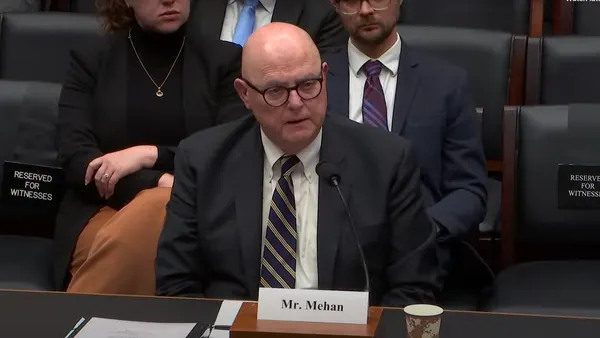UPDATE: Sean Duffy, ReCommunity's president, has recently given multiple interviews stating he thinks Ann Arbor's decision was financially motivated. He said that the city was making less money under the terms of its revenue-sharing agreement due to the downturn in commodity markets, but wasn't willing to renegotiate terms. He also said that ReCommunity recommended purchasing a new baler at least two years ago.
Citing ReCommunity's threat of legal action, Ann Arbor officials declined to address any of these specific claims to MLive. They have reported that no material is being landfilled due to temporary agreements with a number of regional processors. The city is currently working with a consultant to help develop a new contract and analyze MRF operations.
Dive Brief:
- After Ann Arbor, MI terminated a contract with ReCommunity to run the city's material recovery facility (MRF), there has been some confusion over what will happen to recyclables until a new company comes in.
- Recycle Ann Arbor, a nonprofit contracted to run the city's curbside recycling collection, has assured residents that while schedules may change their bins will not be landfilled. Under a temporary arrangement, the materials will be processed by the Western Washtenaw Recycling Authority.
- The fate of commercial recycling, which is collected by the city, is currently less certain. Local officials have said they're working to ensure that as much commercial material is recycled as possible.
Dive Insight:
The city recently decide to terminate a 26-year contract with ReCommunity—currently in its 20th year—due to alleged performance and safety issues, including multiple fires. While the decision seems abrupt, the city has been publicly expressing concerns about ReCommunity since at least last year. In addition to the potential added expense of switching operators, the city also has to spend money on fixing the facility's baler after it recently suffered a "catastrophic failure."
ReCommunity reportedly learned of this decision hours before a City Council meeting last week and considers it unjust. A representative spoke out at the meeting, saying that they employ 50 workers and have been a good partner with the city. The company has indicated that it plans to pursue legal action.
Ann Arbor hasn't laid out a timeline for selecting a new MRF operator, but the city prides itself on a reported 50% diversion rate and is likely to move quickly. A composting program with WeCare Organics, along with a multi-year solid waste plan, has helped the city reach these numbers.









